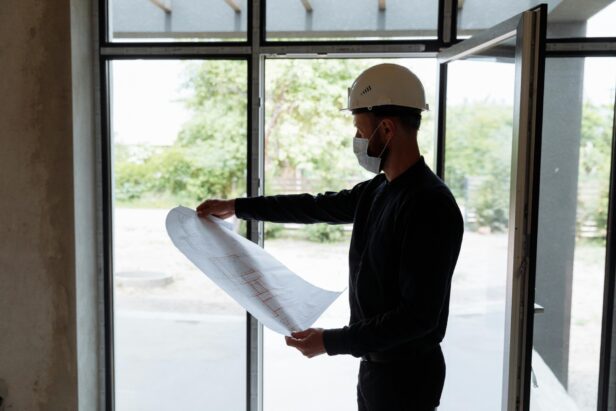San Antonio contractors coordinate with thousands of property owners across Bexar County every year, managing everything from small residential repairs to major commercial developments. These firms pull permits through the City’s Development Services Department (DSD), coordinate trades, and ensure proper inspections before project handover.
Local regulations require contractors to register with the City, maintain general liability insurance, and follow established permit and inspection protocols. Most contractors operate through a three-phase approach: pre-construction planning, active construction coordination, and final close-out with utility releases or certificate of occupancy documentation as needed.
Which Services Do General Contractors In San Antonio Typically Offer?

San Antonio general contractors provide comprehensive residential remodeling services that transform existing homes. Kitchen remodeling ranks among the most requested projects, involving cabinet replacement, countertop installation, plumbing updates, and electrical work. Bathroom remodeling follows closely, with contractors handling everything from tile work to fixture installation and ventilation improvements.
New home construction represents a significant portion of residential work in the area. Contractors coordinate with architects and engineers to build custom homes from foundation to finish. Garage building, house framing, and guesthouse construction extend these capabilities to additional structures on residential properties.
Interior And Exterior Residential Services
Drywall installation and repair form essential parts of most residential projects. We handle texture matching, hole repairs, and full room installations as needed. Home restoration projects often combine multiple trades, addressing structural issues while preserving original character elements.
Roofing services encompass repairs, replacements, and new installations using materials suited to San Antonio’s climate. Flooring projects range from hardwood and tile to carpet and luxury vinyl, with contractors managing subfloor preparation and installation logistics. Painting contractors typically handle both interior and exterior applications, including surface preparation and specialty finishes.
Patios and decks extend living spaces outdoors, with contractors building structures that withstand Texas weather conditions. Attic conversions create additional living space by adding insulation, flooring, and climate control systems. Soffit and stucco repair address common exterior maintenance needs in the region.
Commercial Finish-Outs And Build-Outs
Commercial finish-outs represent major opportunities for San Antonio contractors. These projects transform raw commercial spaces into functional offices, retail locations, or specialized facilities. Contractors coordinate mechanical, electrical, and plumbing systems while installing flooring, ceilings, and interior walls.
Build-out projects typically involve more extensive modifications to existing commercial spaces. We handle space planning, permitting, and construction to meet specific business requirements. Tenant improvement projects require close coordination with property managers and municipal inspection departments.
Sector-Specific Construction Expertise
Healthcare facilities demand specialized knowledge of medical equipment requirements, infection control protocols, and regulatory compliance. Educational projects for K-12 schools involve security considerations, accessibility requirements, and coordination with district maintenance teams.
Industrial construction projects focus on manufacturing facilities, warehouses, and specialized equipment installations. Municipal work includes public buildings, infrastructure improvements, and projects requiring prevailing wage compliance. Religious and office construction each bring unique design challenges and functional requirements.
Retail construction addresses customer flow, security systems, and specialized fixtures for different business types. Higher education projects combine residential, academic, and recreational elements with complex scheduling around academic calendars.
How Does Contractor Registration And Licensing Work In San Antonio?
San Antonio operates through the Contractor Connect program managed by the Development Services Department (DSD). This system organizes contractors into three distinct registration categories: Registered, Registered Plus, and Premier. Each tier reflects different qualification levels and operational capabilities within the city.
All contractors must meet baseline requirements before receiving any registration status. These include submitting a complete application, acknowledging the City’s Code of Ethics, maintaining general liability insurance, and passing an FBI background check. The background check must be completed within 30 days of application submission and represents a non-negotiable requirement across all registration tiers.
Trade-Specific Registration Requirements
Beyond general registration, trade contractors face additional requirements. Electrical and mechanical firms must employ technicians registered with the Texas Department of Licensing and Regulation (TDLR). This state-level credential ensures technical competency in specialized work that affects public safety.
Plumbing contractors similarly need TDLR registration for their technicians. These trade-specific rules create multiple verification layers that property owners can check independently. The state maintains public databases where owners can confirm individual technician credentials before work begins.
Registration Tier Structure
The Registered Plus and Premier contractor categories require additional qualifications beyond baseline registration. Higher tiers demand current payment of all permitting and inspection fees, no unresolved infractions or formal complaints, and documented attendance at City training events. Years of registration history without violations also factor into tier advancement.
Premier contractors must hold credentials such as ICC certification or other approved certifications recognized by the building official. These requirements create measurable standards for operational excellence and regulatory compliance. DSD training attendance demonstrates ongoing commitment to current codes and best practices.
Permit Compliance And Inspection Requirements
All registered contractors must pull permits for applicable work, comply with scheduled inspections, and close permits in a timely manner. This process ensures projects meet code requirements and receive proper documentation. The City tracks permit compliance as part of contractor evaluation for tier maintenance.
Failed permit compliance can result in registration sanctions. The City maintains a public Canceled, Suspended, and Registration Appeals Report that documents contractor sanctions and appeals processes. This transparency allows property owners to research potential issues before hiring decisions.
For specific training dates or detailed registration requirements, contact Development Services at 210-207-1111. The Contractor Connect search tool provides real-time contractor status verification and registration category confirmation for all active contractors in the system.
What Project Process Should You Expect From A General Contractor?

When we begin a new construction project, property owners experience a structured three-phase process designed to deliver results efficiently. Each phase has distinct objectives, milestones, and activities that build toward successful project completion. Understanding this workflow helps owners prepare for what lies ahead and sets clear expectations for collaboration.
Pre-Construction Phase
The pre-construction phase establishes the foundation for everything that follows. We focus on comprehensive planning that addresses scope definition, budget development, and scheduling to prevent costly surprises during construction. This phase typically involves detailed site evaluation, feasibility studies, and permit strategy development.
During scope definition, we work closely with owners to translate project vision into actionable plans. We review architectural drawings, assess site conditions, and identify potential challenges that could impact timeline or budget. Our teams conduct thorough material takeoffs and labor estimates to establish realistic project parameters.
Budget and schedule development requires coordination between multiple disciplines. We analyze material costs, labor availability, and equipment needs while building in contingencies for unforeseen conditions. The permit strategy component involves identifying all required approvals, understanding review timelines, and preparing submission documents that meet local requirements.
Construction Phase
The construction phase transforms plans into physical reality through careful trade coordination and quality management. We implement daily progress monitoring, material logistics coordination, and safety protocols that protect workers and maintain project momentum. Our teams address field conditions as they arise and implement solutions that preserve project integrity.
Trade coordination becomes critical as multiple specialties work simultaneously on site. We schedule electrical, plumbing, HVAC, and other trades to maximize efficiency while preventing conflicts. Regular progress meetings ensure all parties understand current status and upcoming requirements.
Quality assurance runs throughout this phase via systematic inspections and testing. We verify that work meets specifications and building codes before moving to subsequent activities. When issues arise, we implement corrective measures quickly to minimize schedule impact while maintaining quality standards.
Close-Out Phase
The close-out phase ensures proper project completion and seamless handover to the owner. We conduct final inspections, complete all documentation requirements, and coordinate utility releases or certificate of occupancy processes where applicable. This phase requires careful attention to detail and coordination with multiple parties.
Documentation compilation includes as-built drawings, warranty information, operation manuals, and maintenance schedules. We organize these materials for easy owner reference and future facility management. Final inspections verify that all work meets contract requirements and local code compliance.
Project handover involves comprehensive walkthrough with the owner, training on building systems where needed, and resolution of any remaining punch list items. We coordinate utility releases and occupancy permits to ensure owners can begin using their completed project without delays.
Throughout all three phases, we emphasize safety protocols, continuous improvement practices, and clear communication with all stakeholders. This structured approach helps deliver projects on time, within budget, and to the quality standards owners expect.
How Can You Shortlist And Vet San Antonio Contractors Effectively?
Effective contractor vetting protects your project timeline, budget, and quality expectations. We approach this process systematically, evaluating each candidate against clear criteria and official verification channels.
Define Your Project Parameters First
Establish specific scope boundaries before reaching out to contractors. Document your project type, preferred materials, and completion timeline. Set realistic budget ranges that account for permits, inspections, and potential change orders.
Clear parameters help you filter contractors who match your project needs. We find that detailed upfront planning prevents miscommunication during the vetting process and ensures accurate bid comparisons.
Research Using Reputable Local Listings
Start with established platforms that verify contractor credentials and track performance history. Filter results by location, project type, and budget to create an initial candidate list. Review portfolios that demonstrate similar project experience and examine ratings from verified clients.
Portfolio review reveals construction quality, project scope management, and attention to finish details. Look for projects that match your scale and complexity rather than just impressive large-scale work.
Verify Official City Registration Status
Check each contractor’s status through the City’s Contractor Connect search. Verify their registration category and confirm they maintain current standing. Registered Plus and Premier contractors have met additional training and compliance requirements.
City registration category indicates the contractor’s commitment to ongoing education and regulatory compliance. Higher tiers require current permitting fees, training attendance, and clean violation records.
Confirm Insurance And Trade Licensing
Verify general liability insurance coverage meets City minimums for their registration level. Request current certificates of insurance directly from candidates rather than relying on copies. For specialized trades, confirm active TDLR registration through the state’s licensing database.
Insurance verification protects you from liability exposure during construction. Trade licensing ensures skilled technicians handle electrical, plumbing, and mechanical work according to state standards.
Review Permit And Inspection Track Records
Investigate whether contractors consistently pull required permits and close inspections promptly. This pattern indicates they follow proper procedures and understand local code requirements. Contractors who skip permits or delay inspections create project delays and compliance risks.
We verify permit pulling history because it demonstrates the contractor’s familiarity with San Antonio’s inspection process and commitment to legal compliance. Clean inspection records suggest quality workmanship and code knowledge.
Check The City’s Sanctions Report
Examine the Canceled, Suspended, and Registration Appeals Report for any unresolved infractions or complaints. This public document reveals enforcement actions and helps you avoid contractors with compliance issues. Contact the Development Services Department at 210-207-1111 for clarification on any listed violations.
The sanctions report provides transparency about contractor performance and regulatory compliance. Clean records indicate professional operations and regulatory adherence.
Request Written Warranties And References
Ask for written warranty terms covering materials and workmanship for specific time periods. Contact recent project references to verify completion timelines, budget adherence, and client satisfaction. Request references from projects similar in scope and complexity to yours.
Written warranties demonstrate the contractor’s confidence in their work quality and provide legal recourse for defects. References offer insights into communication styles, problem-solving approaches, and professional reliability that ratings alone cannot capture.
Conclusion And Next Steps

San Antonio’s construction landscape provides abundant opportunities for developers and property owners seeking qualified general contractors. The city’s structured approach through the Contractor Connect program creates clear pathways for verifying contractor credentials across all project types in Bexar County. We coordinate closely with registered contractors who understand local requirements and maintain proper DSD training certifications.
Success begins with defining project scope and validating contractor registration status through official City channels. Verify insurance coverage, check the sanctions report, and confirm trade-specific credentials through TDLR when applicable. The three-phase process from planning through project close-out relies on contractors who pull permits properly and maintain compliance with inspection requirements. Call 210-207-1111 for guidance on permits and inspections before breaking ground.
Contact EB3 Construction to discuss your San Antonio project requirements with our registered team.




